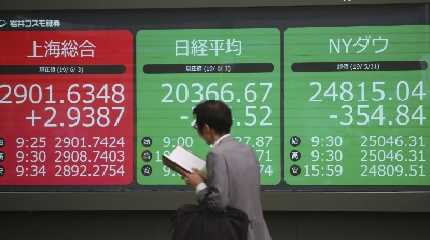
TOKYO (AP) — Global shares rose Wednesday following a rally on Wall Street led by technology companies.
Benchmarks edged up in Europe in early trading, while shares finished higher across Asia despite worries about rising energy costs. The dollar gained against the Japanese yen while U.S. futures fell.
France’s benchmark CAC 40 rose 0.1% in early trading to 6,667.05, while Germany’s DAX gained 0.3% to 14,516.18. Britain’s FTSE 100 rose 0.3% to 7,500.58. The futures for the Dow industrials and S&P 500 were 0.1% lower.
Investors were closely watching what might happen with President Joe Biden joining a NATO meeting and EU Summit Thursday in Europe, where sanctions and the Russian oil embargo will likely top the agenda.
Ukrainian President Volodymyr Zelenskyy was set to make a much anticipated online speech in Japan’s parliament. Japan, which has abided by a pacifist constitution after its defeat in World War II, has taken an unusually vocal position on the war in Ukraine, joining in sanctions against Russia alongside the Western nations.
Japan’s benchmark Nikkei 225 surged 3.0% to finish at 28,040.16. Telecoms and technology company SoftBank Group Corp. gained 7.2% and Fast Retailing added 5.2%.
Australia’s S&P/ASX 200 added 0.5% to 7,377.90. South Korea’s Kospi gained 0.9% to 2,735.05. Hong Kong’s Hang Seng jumped 1.2% to 22,154.08, while the Shanghai Composite rose 0.3% to 3,271.03.
Chinese network equipment maker ZTE Corp.’s shares briefly soared nearly 27% and closed 10% higher after the company said a U.S. judge has allowed a probation period to end after the company was nearly destroyed in a clash with Washington over its dealings with Iran and North Korea.
Bond yields rose sharply for the second day in a row, reflecting expectations of more aggressive interest rate hikes by the Federal Reserve as the central bank moves to squelch the highest inflation in decades. The yield on the 10-year Treasury climbed Wednesday to 2.37%. The yield, which influences interest rates on mortgages and other consumer loans, was at 2.14% late Friday.
Bond yields rose after Federal Reserve Chair Jerome Powell said the central bank was prepared to move more aggressively in raising interest rates in its fight against inflation if need be.
Last Wednesday, the central bank announced a quarter-point rate hike, its first interest rate increase since 2018. The Fed hasn’t raised its benchmark rate by a half-point since May 2000.
Energy and commodity prices were already high as demand outpaced supply amid the global economic recovery, but the war in Ukraine has pushed oil, wheat and other prices even higher. Those higher costs and shipping problems make it more expensive for businesses to operate. Many of those costs have been passed on to consumers and higher prices for food, clothing and other goods could lead them to cut spending, resulting in slower economic growth.
In energy trading, U.S. benchmark crude added $1.14 to $110.41 a barrel in electronic trading on the New York Mercantile Exchange. Brent crude, the international pricing standard, rose $1.51 to $116.99 per barrel.
“With few levers remaining to pressure Russia short of military intervention, the market is beginning to price in the loss of a significant amount of Russian oil needing to be backfilled. It could take years for Russian oil markets to normalize, if ever,” said Stephen Innes, managing partner at SPI Asset Management.
Investors will soon start readying for the next round of corporate earnings reports as the current quarter nears its close at the end of March, and that could provide a clearer picture of how industries continue handling rising costs.
In currency trading, the U.S. dollar edged up to 121.04 Japanese yen from 120.81 yen. The euro cost $1.1020, down from $1.1033.




